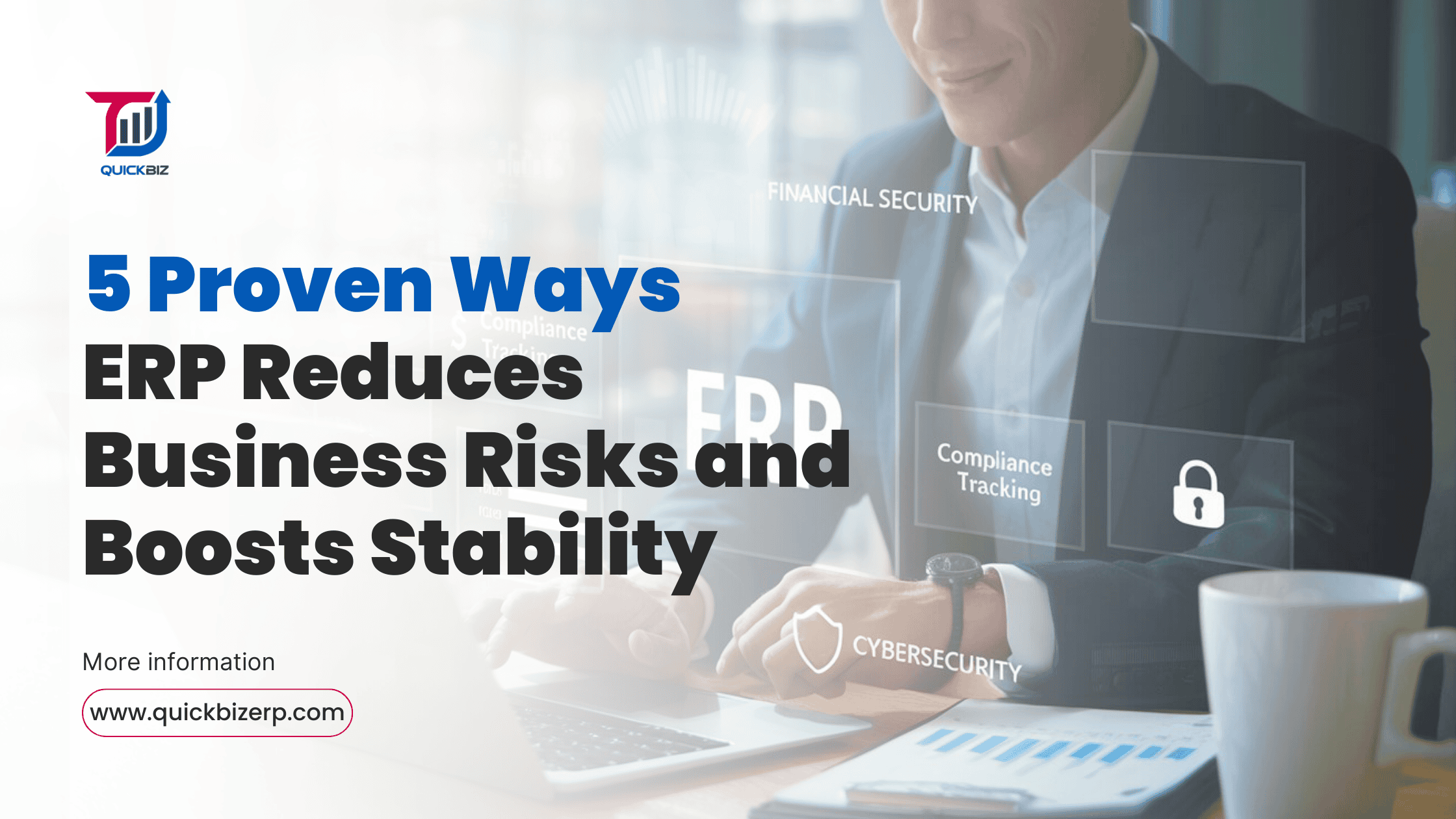5 Proven Ways ERP Reduces Business Risks and Boosts Stability

Introduction
In today’s dynamic business environment, risks are inevitable. From financial fraud and regulatory penalties to supply chain disruptions and data breaches, organizations must constantly navigate uncertainties to ensure stability and growth. A single miscalculation, a compliance oversight, or an operational inefficiency can lead to substantial losses.
Enterprise Resource Planning (ERP) systems serve as a powerful tool in mitigating these risks. By providing real-time data visibility, automating critical processes, and ensuring compliance, ERP enhances business resilience. In this blog, we will explore five key ways ERP helps businesses reduce risks and maintain long-term stability.
1. Strengthening Financial Security
a) How ERP Ensures Secure Financial Transactions
Financial security is a top concern for any business. Traditional accounting systems often lack the controls needed to prevent errors and fraud. ERP systems streamline financial planning, centralizing data and providing real-time visibility into transactions, cash flow, and expenses.
b) Fraud Prevention Through Real-Time Tracking
With ERP, businesses can track financial activities in real-time, reducing the chances of fraudulent activities. Automated alerts can be configured to detect anomalies, such as unauthorized transactions or discrepancies in financial records.
c) Benefits of Automated Financial Reporting and Auditing
Automated financial reporting ensures accurate and up-to-date records. ERP also simplifies audits by maintaining detailed transaction histories, helping businesses comply with financial regulations effortlessly.
2. Enhancing Regulatory Compliance
a) The Importance of Compliance in Different Industries
Regulatory compliance is critical in industries such as manufacturing, healthcare, and finance. Failing to meet compliance requirements can result in heavy penalties, legal issues, and reputational damage.
b) How ERP Helps in Tax Calculations, Industry Regulations, and Audits
ERP solutions are designed to align with industry-specific regulations. They automate tax calculations, generate compliance reports, and ensure that businesses adhere to evolving legal standards.
A real-world example is manufacturers implementing ERP to improve production efficiency, ensuring compliance with safety and quality standards while optimizing operations.
3. Improving Supply Chain Resilience
a) Common Supply Chain Risks Businesses Face
Supply chain disruptions—such as delayed shipments, inventory shortages, and vendor inconsistencies—can severely impact business operations. Without real-time tracking, businesses struggle to make informed decisions.
b) Role of ERP in Inventory Management and Supplier Coordination
ERP’s inventory management system provides end-to-end visibility, preventing stock shortages and excesses while optimizing supplier coordination.
c) Real-Time Insights for Proactive Decision-Making
By analyzing real-time data, businesses can anticipate disruptions and take proactive measures, such as switching suppliers or adjusting production schedules, to maintain continuity. This is particularly beneficial in industries that rely on effective order processing.
4. Reducing Human Errors and Data Inconsistencies
a) How Manual Data Entry Leads to Costly Mistakes
Manual processes are prone to human errors, such as duplicate entries, miscalculations, and incorrect data input. These errors can cause financial discrepancies, compliance issues, and inefficiencies.
b) Role of ERP in Automating Data Handling and Minimizing Errors
ERP eliminates manual data entry by automating key business processes, reducing errors, and improving accuracy. Features like real-time reporting and auto-populated fields enhance data consistency. Businesses transitioning from spreadsheets to an ERP often experience significant improvements in data accuracy and operational efficiency.
5. Strengthening Cybersecurity Measures
a) Increasing Threats to Business Data and Operations
Cybersecurity threats, such as data breaches and ransomware attacks, pose significant risks to businesses. Sensitive financial and customer data must be protected from unauthorized access.
b) ERP’s Role in Encrypting, Securing, and Backing Up Sensitive Data
ERP solutions come with built-in security features, including data encryption, role-based access controls, and automated backups. These measures safeguard business data against cyber threats.
c) Compliance with Global Cybersecurity Standards
Many ERP systems comply with industry security standards, such as ISO 27001 and GDPR, ensuring businesses meet global data protection regulations while minimizing security risks. Cloud-based ERP solutions offer additional security benefits, such as automatic updates and scalable protection against cyber threats.
Conclusion
ERP systems play a crucial role in mitigating business risks and ensuring stability. From enhancing financial security and regulatory compliance to strengthening cybersecurity and supply chain resilience, ERP provides a comprehensive risk management framework. Businesses that adopt ERP solutions gain better control over their operations, reduce vulnerabilities, and improve efficiency. If you’re looking to safeguard your business against risks, now is the time to choose the right ERP system tailored to your industry.

